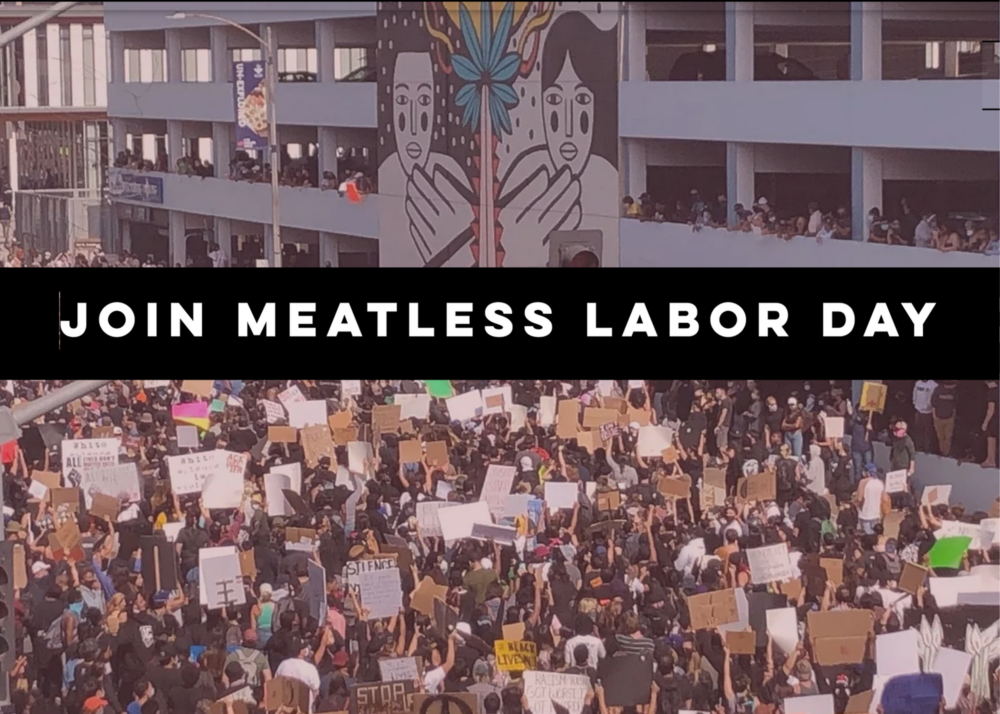
New Campaign Launched by Project Eat Less Meat in Partnership with World Animal Protection Aims to Raise Awareness of Inhumane Conditions for Employees in Meatpacking Industry
Los Angeles, California (August 30, 2021) — Project Eat Less Meat (Project ELM) launched a campaign to expose exploitative labor conditions in California meatpacking plants, primarily impacting Latino workers. The campaign, using the hashtag #MeatlessLaborDay, includes participation from numerous influencers in the Latino community, including celebrity-chef Eddie Garza, and actress and recording artist Vanessa Verduga, as well as global animal welfare nonprofit organization, World Animal Protection.
The astounding COVID-19 rates among meatpacking employees have given the public a glimpse into the social injustices and inhumane working conditions in the meatpacking industry. “Meatpacking plants are often tucked away in remote areas and surrounded by high concrete walls, hidden from society and accountability,” says Noga Golan, Executive Director at Project ELM, “Awareness of the astonishing social injustice was low until the pandemic forced a spotlight on the industry.”
In the last twelve months numerous lawsuits have been filed against meat processors claiming blatant disregard of safety protocols, racial discrimination, misleading shareholders about coronavirus policies, treacherous working conditions, wrongful deaths tied to COVID-19, and even accusations of meat plant managers organizing a betting pool on how many employees would get infected with COVID-19. Only recently has Tyson Foods, America’s largest chicken producer, required its employees to get vaccinated. However, hundreds of employees have already died from COVID-19, and hundreds of thousands have been infected with the virus.
Through its investigative work, Project ELM found that a culture of fear is cultivated among employees, preventing them from reporting mistreatment and hazardous working conditions, even as COVID-19 cases rise staggeringly. Many employees are immigrants or undocumented, but even documented workers operate under a looming fear of deportation and are hesitant to speak up. Project ELM has made its findings from its investigation public on the campaign website.
Meatless Labor Day is intended to alleviate the pressure for meatpacking labor workers on one of the busiest days of the year. When demand for meat is high, meatpacking workers must process more meat faster and work longer hours, significantly increasing their risk of injury. “Labor Day is meant to pay tribute to hardworking laborers, not make them work longer hours at greater risk. The pledge to reduce meat consumption on Labor Day is targeted at raising awareness of these issues and alleviating some of the pressure for meatpacking workers this holiday weekend,” said Eddie Garza, celebrity-chef, activist, and leading figure in the movement to reform food systems in Latino communities.
World Animal Protection, a global animal welfare nonprofit organization, is supporting the Meatless Labor Day campaign efforts. “At World Animal Protection, we understand that completely cutting meat out of your diet might not be feasible. However, given that the United States has one of the highest rates of meat consumption of any country in the world, eating less meat, thus lowering demand, is crucial to improving conditions for workers in the meat industry, not to mention improving the lives of farmed animals and consumer health, while slowing climate change,” said Joe Loria, Meat Reduction Campaign Manager at World Animal Protection, US. “We have a high quantity, low quality animal agriculture model – factory farming. As a resource to aid in lowering consumption of animal products, we encourage people to sign up for Meating Halfway, World Animal Protection’s 21-day meat reduction journey at MeatingHalfway.us.”
To learn more about the Meatless Labor Day campaign, visit: https://www.meatlesslaborday.com/
About Project Eat Less Meat
Project Eat Less Meat is a California-based impact marketing organization focused on reducing meat and other animal-product consumption among the people that eat the most meat. The organization also provides marketing services to plant-based companies targeting the Latino community. More information on Project Eat Less Meat can be found at: https://www.projecteatlessmeat.com/
About World Animal Protection
World Animal Protection has moved the world to protect animals for more than 55 years. With offices in 13 countries, World Animal Protection works to give animals a better life. The organization’s activities include working with companies to ensure high standards of welfare for the animals in their care; working with governments and other stakeholders to prevent wild animals being cruelly traded, trapped or killed; and working for the better treatment of farmed animals.
World Animal Protection influences decision-makers to put animal welfare on the global agenda and inspires people to change animals’ lives for the better. More information on World Animal Protection can be found at: https://www.worldanimalprotection.us/

